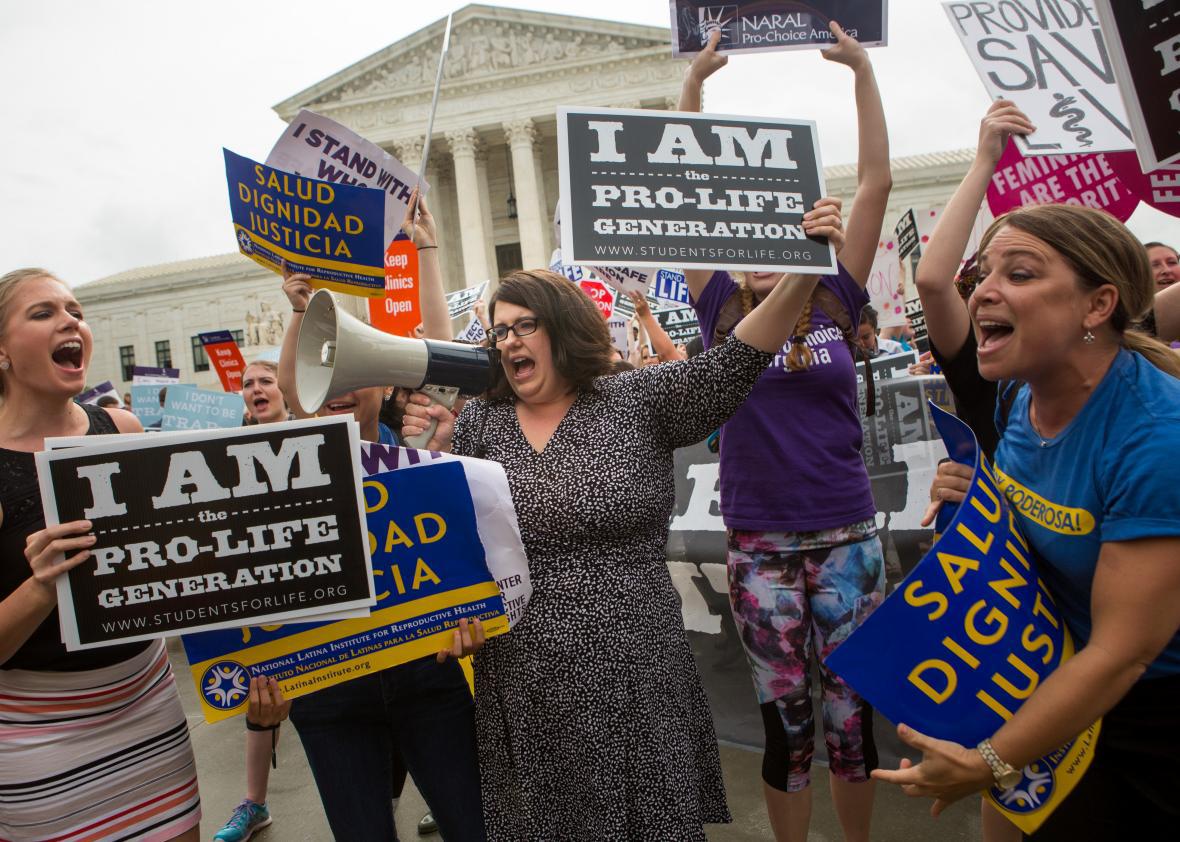In Monday’s paper, the New York Times published an opinion piece arguing that the mainstream feminist movement should accept into its fold groups that equate abortion with murder. Lauren Enriquez, a public relations manager at the anti-abortion Human Coalition, writes that feminism has come to stand for “snuff[ing] out what is unique about us as women: our ability to protect, nourish and nurture new life inside of our bodies.”
Enriquez takes umbrage at the Women’s March on Washington’s exclusion of anti-abortion groups from the official list of march partners. “To us, ‘resistance’ has to include opposition to the lie that freedom can be bought with the blood of our preborn children,” she writes. “We reject the pressure to believe that killing our children and living full lives are mutually inclusive.”
The Times exhibited questionable editorial judgment in publishing an essay from a paid PR representative. As one might expect, Enriquez uses the piece to tout her own organization’s “tangible, compassionate” work, performed in part by men who “want to end abortion not because they want to control women, but because they agree that requiring the sacrifice of a woman’s children in exchange for her success is unimaginable.” The Human Coalition’s website calls abortion “the ultimate exploitation of women” and “the worst holocaust in human history”—the implication being that abortion is worse than rape and worse than the actual Holocaust.
To support her point that the feminist movement should lift up anti-abortion voices, Enriquez cites data from a recent poll funded by Marist College and the Knights of Columbus, claiming that “just over half of all women want to see further restrictions on abortion.” The Knights of Columbus is an anti-abortion group, so the results of this poll should be taken with a dash of skepticism. But even Enriquez’s cherry-picked conclusion misrepresents the results of the survey, which saw 42 percent of respondents identify as “pro-life,” compared to 52 percent who identified as “pro-choice.” Of all adults, the only age group in which a greater proportion of respondents identified as “pro-life” than “pro-choice” was people aged 70 and over. The poll’s sampling of women found 55 percent identified as “pro-choice” and 41 percent as “pro-life.”
It looks like Enriquez got her information from the part of the survey that asked whether people thought abortion should be allowed in any circumstance, no circumstances, or under some set of varyingly narrow circumstances. 52 percent of women said they thought abortion should be either totally outlawed, only allowed to save the life of the pregnant woman, or only allowed in cases of rape, incest, or to save the life of the pregnant woman. 48 percent thought abortion should be permitted in more circumstances than that.
This question does not ask what Enriquez claims it does: whether women want to see further restrictions on abortion. There’s a good chance that most people don’t know where, when, and what kind of abortions are allowed in their states. Abortion restrictions are forever being proposed, getting passed, getting mired in the courts, being stayed by judges, and getting struck down. There is a great deal of misinformation about abortion policy in the U.S., in part because it’s constantly changing and decided in complicated judicial opinions. I wonder where Enriquez’s 52 percent of women think abortion law currently stands, and if, given all the information, whether they’d actually want legislatures and courts to make the opinions they hold today into law.
Of course, the judiciary does not and should not operate on the whims of public opinion, and feminist movements do not owe it to anyone to accept an agenda that would make it a crime for a woman to control her own reproductive organs. The anti-choice worldview is explicitly anti-woman, because it denies women agency and autonomy. Mainstream feminism is perfectly happy to embrace women who would never themselves seek abortion care. But women and men who want to impose their views on others through legal restrictions on women’s bodies cannot be feminists, because they want to make a woman’s decisions for her.
The great irony in Enriquez’s argument, and most anti-abortion rhetoric, is that abortion restrictions don’t keep women from getting abortions. They keep women from getting safe, legal abortions, relegating women seeking abortion care to indignity, punishment, and potentially injury or death. If people like Enriquez truly cared about reducing abortion rates, they’d focus their advocacy and money on one thing that has been proven to reduce abortion rates: access to contraception. Contraception prevents unplanned pregnancies and abortions while giving women more agency over their own reproductive lives. Abortion restrictions, when they function as Enriquez and her cohort intend, force women to carry pregnancies to term and give birth against their will.
There’s one question in the Marist/Knights of Columbus poll that pulls back the veil on any dubious claims that anti-abortion activists are true feminists: “In the long run, do you believe having an abortion improves a woman’s life or in the long run do you believe abortion does more harm than good to a woman?” The only opinion that matters in this scenario is not the person taking the poll or the legislator writing some new law. It’s the woman seeking the abortion. Women’s self-determination—that’s what abortion restrictions take away. It’s also what feminism is all about.
